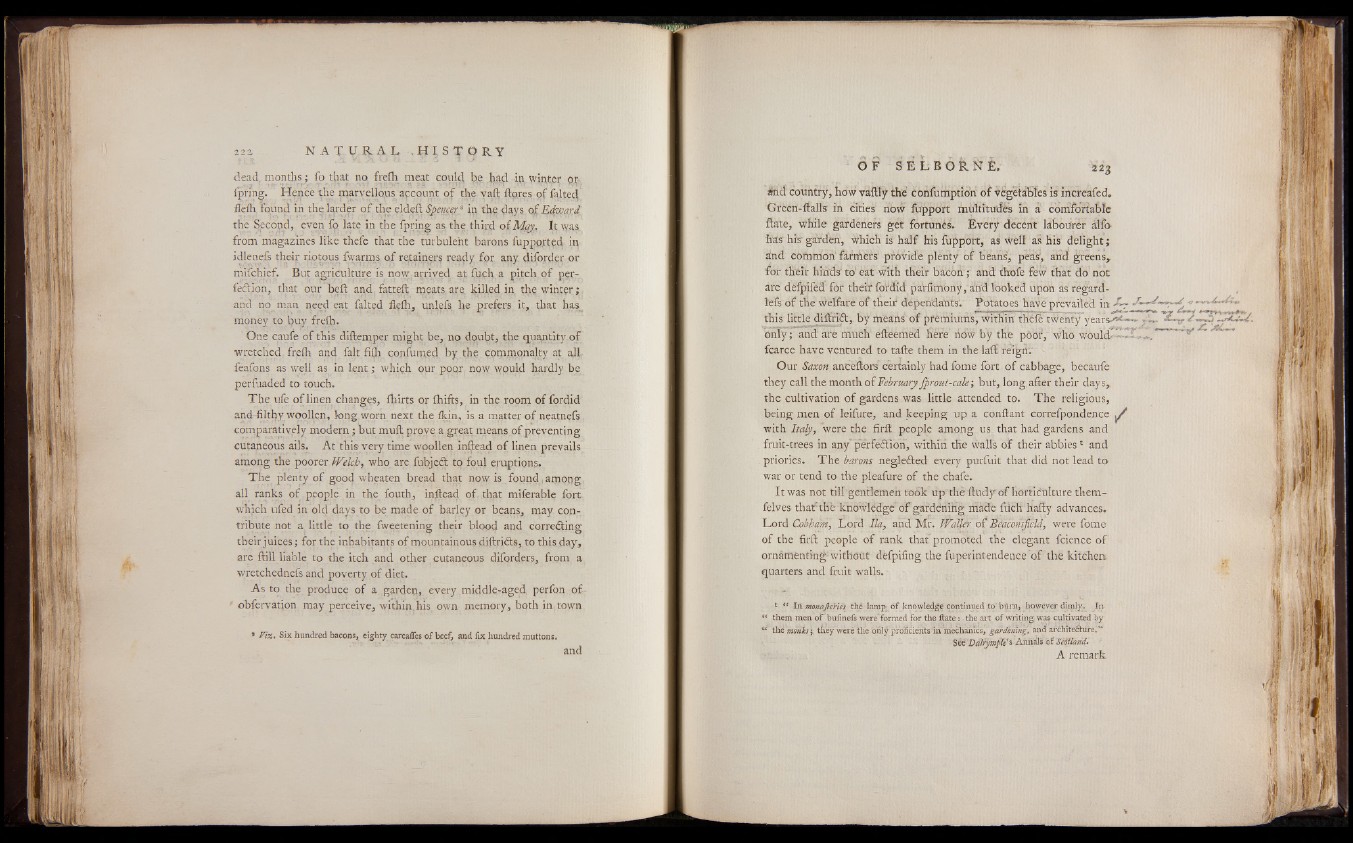
dead months; fo that no frcfli meat could, be had ip.winter on
fpring. Hence the marvellqus'apcaunt of the. vaft ftp.res of falted
flefh found in the larder of the eldeft Spence,r s ip the <^ys,qf
the §ecopd, even fp late in the fpring as, the. third of May, It vyas.
from magazines like thefe that the turbulent barons fupp.qrtpd| in
idlenefs their riotous {warms, of retainer^ ready fpr any. difoydpr or
mifchlef. But agricultum is now,arrived at inch, a pitch of ppxr
feftion, that our Tbeft and. fatted; meats, are. kilfed in, the vinter;.
and no man need eat faltpd flplh, unlefs l^e prefers.it, that has,
money to buy frelh.
One caufe of this diftemper might be, no doubt, the quantity of
•wretched. fr,elh and fait fifli confutped. by the commonalty at all
feafoqs as well as in lent; which our poop now, would hardly be
perluaded to touch.
The ufe of linen changes, ftlirts or fhifts, in the room of fordid
and filthy woollen, long worn next the lkin, is a matter of neatnefs,
comparatively modern; but muft prove a great means of preventing
cutaneous ails. At this very time wpollep inijtead of linen prevails
among the poorer Welch, who are fubjeft to foul eruption?,.
The plenty of good wheaten bread that now is found, among
all ranks of people in the fouth, inftead of that miferable fort
whjch ufed in old days to be made of barley or beans, may contribute
not a little to the fwqetening their blood and correcting
their juices; for the inhabitants of mountainous diitricts, to this, day,
are ftill liable to the itch and other cutaneous diforders, from a
wretchednefs and poverty of diet.
As to the produce of a garden, every middle-aged, perfop o£-
' obfervation may perceive, within,his, own memory, both in town
» Fisc. Six hundred bacons, eighty carcaffes of beef, and fix hundred muttons.
and
country, how vaftljr the confurtiptio'n of Vegetables is increafed.
Gréen-ltalls in cities' now fupport mutönsfés in a comfortable
ftate, while gardeners get fortunes. Every decent labourer alfo
has' his garden, tyhich is half his fupport, as well as his delight;
dnd cóftimon' farthers provide plenty of beans', peas1, and greens,
for thbir hinds'to'èat with their bacoh ;' and drofe few that do not
are dèrpiféd for their fordid paVfimony, and looked upon as regard-
1'efs of the Welfare óf theif dépefidabts'. Potatoes have'prevailed in £ ?
this little diffrift,, b^ m'êahs of prertiiums, vVithin tlicle twenty years^»4—~ ,U-
ionly; and1 aïè much éfteèmed here lidw by thfe poor’,' who woulcbM Z. “
fcarce have ventured to tafte them in the laft reign'.
Our Saxon anceftors certainly had fome fort of cabbage, becaufe
they call the month of February fprout-cale; but, long, after their days,
the cultivation of gardens was little attended to. The religious,
being men of leifure, and keeping up a conftant correfpondence y
with Italy, were the firit people, among us. that had gardens and
fruit-trees in any* perfection, withiri the wall’s of their abbies1 and
. priories. The barons negledted every purfuit that did not lead to
war or tend to the pleafure of the chafe.
It was not till'gentlemeil took tip the ftudy of horticulture them-
felves that*thfe knowledge o f gardénihg made fetch"halfy advances.
Lord Cobhtm, Lord Ila, arid Mr. Waïïe[r of Bêacomjïèld, were fome
of the firft people of rank that" promoted the elegant fcience o f
ornSmènting;without dèfpifing the fuperintendence o f the kitchen,
quarters and fruit walls.
* “ In monaJieVies the lamp of knowledge continued to' burn, however dimly. In
“ them men of bufinefs were*formed for the ftate: the art of writing was cultivated by
u the monks j. they wèré the only proficients'in "mechanics,' gardening', and architebhire.”
Sê&Daïrjmp&s Annals fef Scotland.
A remark